
Journal of Condensed Matter Nuclear Science
metrics 2024
Advancing Knowledge at the Intersection of Physics and Energy.
Introduction
The Journal of Condensed Matter Nuclear Science, published by the International Society for Condensed Matter Nuclear Science in the United Kingdom, serves as a pivotal platform for researchers exploring the intersections of condensed matter physics and nuclear science. With an ISSN of 2227-3123, this journal has been actively contributing to the academic discourse from its inception in 2016 through its latest volume in 2022. Although classified in Q4 quartiles across various categories, including Atomic and Molecular Physics, Condensed Matter Physics, and Nuclear Energy and Engineering, the journal provides a unique lens on innovative approaches and perspectives that could significantly impact future research directions. This open-access journal appeals to an audience keen on investigating the theoretical and experimental aspects of condensed matter nuclear science, fostering a collaborative environment for scientists, engineers, and students alike. By advancing discussions in this niche field, it aims to attract attention and inspire groundbreaking discoveries that underpin the evolving landscape of nuclear energy and applications.
Metrics 2024
 0.10
0.10 -
- 0.10
0.10 8
8Metrics History
Rank 2024
Scopus
IF (Web Of Science)
JCI (Web Of Science)
Quartile History
Similar Journals

Condensed Matter Physics
Empowering Researchers with Open KnowledgeCondensed Matter Physics is a prestigious open-access journal published by the Institute of Condensed Matter Physics, National Academy of Sciences Ukraine. Since its inception in 1993, this journal has been dedicated to the dissemination of high-quality research in the field of condensed matter physics, providing a platform for scientists worldwide to share their latest findings. With an ISSN of 1607-324X and an E-ISSN of 2224-9079, it caters to a diverse audience, including researchers, professionals, and students. Although classified in the Q4 quartile for both condensed matter physics and miscellaneous physics and astronomy category, the journal plays a vital role in fostering communication among experts and advancing knowledge in this dynamic field. It is particularly vital for emerging researchers as it supports open access, ensuring that critical research is available to all, removing barriers to information. The journal's relevance remains steadfast, covering a wide array of topics and encouraging interdisciplinary approaches, and it is poised to inspire future scientific explorations until at least 2024.
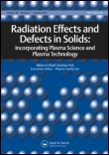
Radiation Effects and Defects in Solids
Transforming Understanding of Solid Material Behavior Under RadiationRadiation Effects and Defects in Solids is a prestigious academic journal published by TAYLOR & FRANCIS LTD that has been at the forefront of research related to the impacts of radiation on various solid materials since its inception in 1989. With an ISSN of 1042-0150 and an E-ISSN of 1029-4953, this journal serves as an essential resource for researchers and professionals in the fields of Condensed Matter Physics, Materials Science, and Nuclear and High Energy Physics. Despite its current categorization in the Q4 quartile across these disciplines, Radiation Effects and Defects in Solids remains critical for advancing knowledge of material responses to radiation, which is vital for applications in nuclear energy, space exploration, and radiation therapy. The journal publishes original research articles, reviews, and letters that provide insights into material properties, radiation dosimetry, and defect structures, fostering collaboration and innovation within the scientific community. As the field evolves, Radiation Effects and Defects in Solids continues to play a significant role in disseminating valuable research findings and keeping pace with emerging trends in materials science and radiation physics.
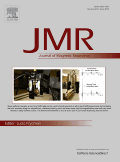
JOURNAL OF MAGNETIC RESONANCE
Transforming Research into Practical Applications of Magnetic ResonanceThe JOURNAL OF MAGNETIC RESONANCE, a leading peer-reviewed publication from ACADEMIC PRESS INC ELSEVIER SCIENCE, serves as a vital platform for disseminating cutting-edge research in the fields of biochemistry, biophysics, and condensed matter physics. With an ISSN of 1090-7807 and an E-ISSN of 1096-0856, this journal is committed to publishing innovative studies that explore the principles and applications of magnetic resonance techniques. Ranking in the Q3 and Q2 quartiles across various categories in 2023, it reflects a robust standing within the academic community, especially noted for its contributions to nuclear and high energy physics where it ranks 29th out of 87 journals. The journal's comprehensive scope and emphasis on accessible research make it an essential resource for researchers, professionals, and students alike, facilitating advancements in both theoretical and practical aspects of magnetic resonance. With conversion years spanning 1997 to 2024, the journal continues to uphold its legacy as a cornerstone of knowledge in the best practices of scientific research.

PHYSICAL REVIEW LETTERS
Unveiling Breakthroughs in Physical SciencePhysical Review Letters, published by the American Physical Society, is a premier journal in the field of Physics and Astronomy renowned for its rapid dissemination of high-impact research findings. With a distinguished history dating back to 1958 and an impressive ranking of #13 out of 243 in the general physics category, it stands proudly within the Q1 quartile, placing it in the top 6% of journals in its field. The journal focuses on brief reports of significant fundamental research across all areas of physics, making it an essential resource for researchers, professionals, and students seeking to stay at the forefront of developments in their field. Although Physical Review Letters does not offer open access options, its rigorous peer-review process ensures a high standard of quality and relevance in its published articles. With an unwavering commitment to advancing the understanding of physical science, this journal is indispensable for those looking to make a genuine impact in their research endeavors.
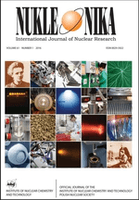
NUKLEONIKA
Transforming Knowledge into Practical SolutionsNUKLEONIKA, published by SCIENDO, is a leading open access journal that has been serving the scientific community since its establishment in 1968. Focused on the domains of Nuclear and High Energy Physics, Condensed Matter Physics, and Nuclear Energy and Engineering, this journal provides a platform for innovative research and technological advancements in a variety of interdisciplinary fields. With an impressive history of publications and a current Q3 ranking in several categories, including Safety, Risk, Reliability and Quality and Waste Management and Disposal, NUKLEONIKA is recognized for its significant contributions to scientific discourse. Open access since 2014, the journal ensures that all research outputs are freely available, facilitating broad dissemination and accessibility for researchers, professionals, and students alike. Located in the heart of Warsaw, Poland, NUKLEONIKA aims to inspire collaborative efforts and foster a deeper understanding of complex physical phenomena and their practical implications.

INSTRUMENTS AND EXPERIMENTAL TECHNIQUES
Bridging Theory and Practice in Instrumentation ResearchINSTRUMENTS AND EXPERIMENTAL TECHNIQUES is a renowned academic journal dedicated to the field of instrumentation and experimental methodologies within physics and engineering. Published by MAIK NAUKA/INTERPERIODICA/SPRINGER, this journal serves as a vital platform for disseminating innovative research findings, detailed experimental techniques, and advancements in instrumentation technologies. Operating since its inception in 1968, it has established itself as a reputable source for scholars and industry professionals, though it currently holds a category quartile ranking of Q4 in Instrumentation based on the 2023 metrics. With an ISSN of 0020-4412 for print and E-ISSN of 1608-3180 for electronic formats, the journal is accessible to a global audience, offering crucial insights that can lead to significant advancements in experimental approaches across various scientific domains. Despite a current Scopus ranking placing it in the lower percentile, the journal continues to contribute to the ongoing discussions and developments in instrumentation, making it an essential read for researchers, professionals, and students eager to enhance their knowledge and expertise in this specialized area.

Radiation Detection Technology and Methods
Innovating Detection for a Safer TomorrowRadiation Detection Technology and Methods is a prominent academic journal published by Springer Singapore Pte Ltd, dedicated to advancing the field of nuclear and high-energy physics, as well as nuclear energy and engineering. Established in 2017, this journal provides a platform for the dissemination of pioneering research and innovative methodologies in radiation detection technology. As of 2023, it holds a commendable Q2 ranking in both the categories of Nuclear and High Energy Physics and Nuclear Energy and Engineering, underscoring its significance in fostering scholarly discourse within these vital fields. With ISSN 2509-9930 and E-ISSN 2509-9949, the journal aims to cater to a diverse audience of researchers, professionals, and students, emphasizing open access to knowledge. The journal's contributions are particularly crucial for those engaged in the development of safer and more efficient radiation detection techniques, ultimately bridging the gap between theory and practical applications in energy security and health physics. For researchers seeking a dedicated outlet for their work, Radiation Detection Technology and Methods represents an invaluable resource and an opportunity to influence the future of radiation science.
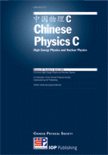
Chinese Physics C
Advancing the Frontiers of Physics ResearchChinese Physics C is a premier, peer-reviewed journal published by IOP Publishing Ltd, dedicated to advancing knowledge in the fields of Astronomy and Astrophysics, Instrumentation, and Nuclear and High Energy Physics. With an impressive impact factor reflecting its standing in the Q1 quartile across multiple categories, this journal serves as a vital resource for researchers, professionals, and students seeking to engage with cutting-edge developments and experimental findings. Since its inception in 2008, Chinese Physics C has fostered significant collaborations and discussions within the global physics community, enabling easy access to high-quality research through its open access options. Operating from the United Kingdom with a commitment to excellence, this journal not only showcases high-impact papers but also encourages innovative methodologies and interdisciplinary approaches, solidifying its role as an essential platform for dissemination and dialogue in the rapidly evolving landscape of physics.
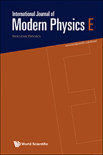
INTERNATIONAL JOURNAL OF MODERN PHYSICS E
Exploring the Universe: Insights from Modern PhysicsThe INTERNATIONAL JOURNAL OF MODERN PHYSICS E, published by WORLD SCIENTIFIC PUBL CO PTE LTD, serves as a distinctive platform for the dissemination of high-quality research in the fields of Nuclear and High Energy Physics, as well as Physics and Astronomy. With an ISSN of 0218-3013 and covering a timeline from 1996 to 2024, the journal has established itself within the academic community, achieving a respectable Q3 ranking in its respective categories for 2023, underscoring its commitment to advancing knowledge in modern physics. Although it operates without an open access model, the journal's curated content is accessible to a wide audience of researchers, professionals, and students engaged in cutting-edge physics. Set in Singapore, this journal not only contributes to scholarly discussions but also fosters a global collaboration among physicists, making it an invaluable resource for those seeking to deepen their understanding and contribute to ongoing dialogues in the scientific community.

RIVISTA DEL NUOVO CIMENTO
Pioneering Insights for a Brighter Scientific Future.RIVISTA DEL NUOVO CIMENTO, published by SPRINGERNATURE, is a prestigious journal dedicated to advancing research in the field of physics and astronomy. Established in 1969, this journal has consistently delivered high-quality, peer-reviewed articles that explore emerging topics and significant developments in the broad scope of general physics. With an impressive Q1 ranking in the 2023 category for Physics and Astronomy and a remarkable Rank #23/243 in Scopus, it is recognized as a leading resource, standing in the 90th percentile of its field. Although not an open-access journal, RIVISTA DEL NUOVO CIMENTO ensures wide dissemination of its impactful content, making it essential reading for researchers, professionals, and students who are eager to stay ahead in their academic pursuits. Join a vibrant community dedicated to excellence and innovation in physics and astronomy by exploring the cutting-edge works published in this esteemed journal.